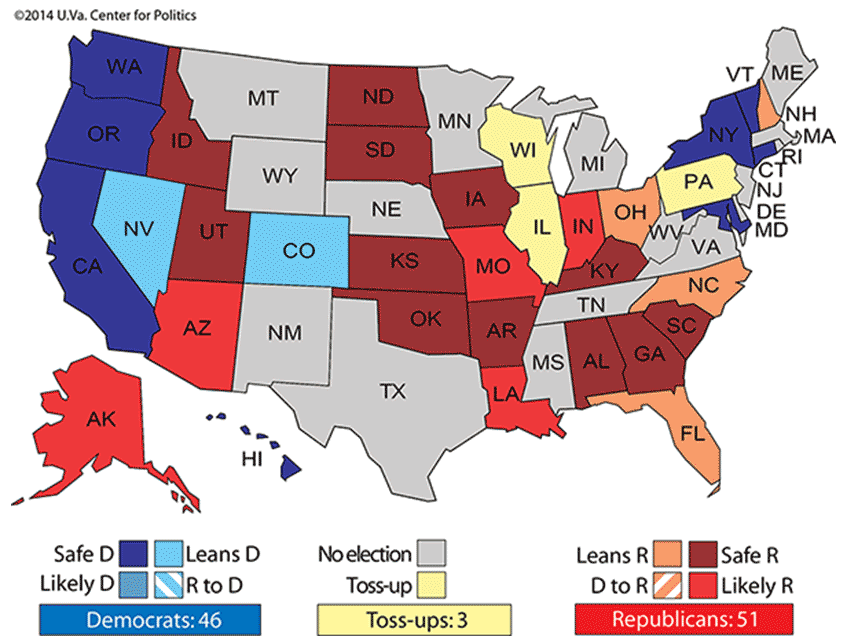Ricochet is the best place on the internet to discuss the issues of the day, either through commenting on posts or writing your own for our active and dynamic community in a fully moderated environment. In addition, the Ricochet Audio Network offers over 50 original podcasts with new episodes released every day.
 Senate Timing, Temperament, and 2016 Odds
Senate Timing, Temperament, and 2016 Odds
 I got to sit in on a roundtable talk with a Republican senator yesterday, during which said lawmaker expressed hope of getting tax reform moving in Congress. My thought: will timing and temperament make this possible?
I got to sit in on a roundtable talk with a Republican senator yesterday, during which said lawmaker expressed hope of getting tax reform moving in Congress. My thought: will timing and temperament make this possible?
As for the former (timing), we’re already midway through 2015. Next year is a reelection year for one-third of the U.S. Senate and the entire House. Does that make for more productivity or less — especially with something as prolonged as tax reform?
Which leads to the question of temperament.
Consider 2014 and what gridlock (352 bills that passed the House and awaited Senate action) did to Harry Reid and the then-majority Democrats.
Which just might be the Democratic way of thinking in 2016: make sure nothing happens in the Senate and let the now-majority Republicans take the blame for gridlock. (Unless you’re a believer that the next Senate Democratic leader, New York’s Charles Schumer, is conciliatory in ways Reid wasn’t)
About 2016 and who winds up in control of the Senate: Barack Obama picked up 8 Senate seats in 2008 (giving back 9 in 2014). As for other first-time, non-incumbent presidential winners . . . George W. Bush lost 4 in 2000, Bill Clinton, George H.W. Bush, and Jimmy Carter gained none, Ronald Reagan picked up 12 in 1980, Richard Nixon gained 6 in 1968, JFK picked up 2, Dwight Eisenhower picked up 1 in 1952, and FDR netted 9 in 1932.
In modern times (with the exception of Bush in 2000), there’s no pattern of a president winning a first term while losing badly in the Senate (also, keep in mind that Bush was a Republican inheriting a GOP congress).
As for a repeat of the 1980 scenario: Democrats (Reagan’s opposition party) had controlled the Senate for over a quarter of a century; Reagan swept 44 of 50 states. No one expects a similar tidal wave next year.
All of which makes a scenario where Republicans win the White House while Democrats run wild in the Senate unlikely.
Democrats only have to defend 10 Senate seats next year (the GOP has to guard 24). Can they manage to fall short of the minimum four seats they’ll need to regain control of the chamber in 2017? That all depends on:
1) Holding on to two problem seats in Colorado and Nevada.
2) Running strong in seven states that Obama won twice but that currently have Republican incumbents: Florida, Illinois, Iowa, New Hampshire, Ohio, Pennsylvania, and Wisconsin (North Carolina night also end up in play, but Obama carried it only once).
3) The off chance of an upset here or there that Republicans weren’t expecting (keep an eye on Arizona).
Don’t discount the importance of that latter point, especially since the Democrats already are having problems in Pennsylvania (party leaders there want someone other than 2010 retread Joe Sestak) and Florida (Democrats there may be looking at a Todd Aiken problem). Suppose Chuck Grassley and Rob Portman run smart races and survive in Iowa and Ohio, respectively (Grassley is an institution; Portman won’t lack for money), and suddenly Democrats are looking at a plus-three scenario (and that’s assuming the two holds in Colorado and Nevada).
One other wildcard: Hillary Clinton. Does she or doesn’t she have coattails — that’s assuming she wins. If she doesn’t, it’s because she came up short in these same Senate battleground states. Which again raises the question of a mixed-verdict election in which the public goes for a Republican chief executive but Democratic lawmakers.
Here’s a 2016 Senate landscape produced by the University of Virginia’s Center for Politics.

And, for what it’s worth: here’s a list of the fiercest 10 Senate races of 2016
Published in Elections, Politics



Nice post.
You need to define Tax Reform. Like Immigration Reform, it sounds great, but means different things to different people. If you’re talking Rubio / Lee, I hope your efforts fail.
Here’s the problem with any sort of tax reform (regardless of definition): After the Iraq War and Obamacare, the American people have developed a certain aversion to the big, shiny government plan of action. That sort of aversion, combined with both stagnant employment/GDP and retirement of baby boomers, pretty much requires that the next President and Congress be actual stewards of the taxpayer dollar.
So sorry, no tax reform. No one trusts it will be beneficial to anyone, and in fact, may exacerbate things.